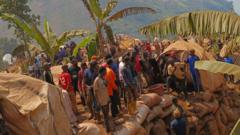The Rubaya mine, located in the Masisi Hills of North Kivu province, Democratic Republic of Congo, has become a focal point for the global tech industry due to its rich deposits of coltan ore. Recent access granted by M23 rebels has allowed the BBC to capture the day-to-day labor of more than 10,000 miners, all dedicated to extracting this vital mineral used in electronic devices worldwide.
Miners navigate treacherous terrain as they excavate deep underground, utilizing simple tools to harvest coltan. Quotes from workers, such as Peter Osiasi, reveal the difficult conditions they endure yet also underscore the personal transformations that mining brings—such as declining notices, financial stability, and family growth.
As the region grapples with a ceasefire agreement aimed at reducing decades of unrest, the Rubaya mine remains unaffected by armed conflict, overseen by a recent security arrangement by the M23. "We have already solved so many issues… people can work without fear,” says mine supervisor Patrice Musafiri, emphasizing the transformative changes made under rebel governance.
The broader context of conflict in eastern DR Congo, complicated by ethnic tensions and historical grievances, reflects how deeply intertwined local politics are with the mining economy. Global investments in the region, particularly from US firms, signal potential shifts in power dynamics, with promises of infrastructure development and community improvement behind them.
Nonetheless, miners like Osiasi remain marginalized, advocating for higher wages and better living conditions amid fluctuating fortunes in their workplace. As foreign interests eye Rubaya's mineral wealth, local hopes hinge on enduring peace—something miners like Osiasi plead for as they continue to toil in the heart of the conflict-ridden landscape.
Amidst the promise of resources lies a call for equitable development that addresses the needs of local communities, ensuring that the wealth extracted from their land translates into tangible benefits for their lives.


















